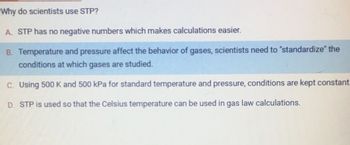
Chemistry
10th Edition
ISBN: 9781305957404
Author: Steven S. Zumdahl, Susan A. Zumdahl, Donald J. DeCoste
Publisher: Cengage Learning
expand_more
expand_more
format_list_bulleted
Concept explainers
Question
thumb_up100%

Transcribed Image Text:Why do scientists use STP?
A. STP has no negative numbers which makes calculations easier.
B. Temperature and pressure affect the behavior of gases, scientists need to "standardize" the
conditions at which gases are studied.
C. Using 500 K and 500 kPa for standard temperature and pressure, conditions are kept constant.
D. STP is used so that the Celsius temperature can be used in gas law calculations.
Expert Solution
This question has been solved!
Explore an expertly crafted, step-by-step solution for a thorough understanding of key concepts.
This is a popular solution
Trending nowThis is a popular solution!
Step by stepSolved in 3 steps

Knowledge Booster
Learn more about
Need a deep-dive on the concept behind this application? Look no further. Learn more about this topic, chemistry and related others by exploring similar questions and additional content below.Similar questions
- 1. A student neglected to keep the end of the deliyery tube under the surface of the water displaced os Of your calculations. hydrogen while the collected gas was cooling. What effect will this have on the volume of hydrogen collected? What effect will this have on the calculated mass of magnesium? a balanced chemical equation.arrow_forwardThe density of NO gas at 16°C and 1.27 atm is O a. 1.61 g/L. O b. 1.71 g/L. O c. 1.98 g/L. O d. 2.36 g/L. O e. 1.50 g/L.arrow_forwardWhich concept best accounts for the fact that gases can escape through a pinhole faster at higher temperatures? Select one: O a. A gas is composed of molecules whose size is much smaller than the distances between them. O b. Gas molecules move randomly--at various speeds and in every possible direction. O c. Except when molecules collide, forces of attraction and repulsion between them are negligible. d. When collision occur, they are elastic. Oe. The average kinetic energy of gas molecules is proportional to the absolute temperature. Frombois III (Log out) G Search or type URL % 5 6 & 7 || ☆ 00- 8 ( ( Finish attempt ...arrow_forward
- A sample of elemental hydrogen takes up 2.5 L under 760 Torr at 22 °C. Use Ideal Gas Law to … find moles of gas in this sample: _____ … find volume in L of this gas sample under 350 Torr at the same T: _____ … find pressure in Torr of this gas sample at 0 °C in the same volume: _____arrow_forwardusing Ideal gas law. volume =) TOL Temperature => 273k Pressure = 1 atm moles =>> ?arrow_forwardIn combined gas law calculations a. pressures can only be in torr b. volumes can only be in liters c. temperatures can only be in Kelvin d. pressures can only be in kPa O A B *arrow_forward
- a.) given 1 mol of gas in 1 L container at 0.00oC what is the pressure? b.) given 1 mol of gas at STP what is the volume?arrow_forwardHe has a velocity of 1,361 m/s. What is the velocity of Cl2 gas? Assume standard temperature. Nitrogen has a velocity of 515 m/s. What would be the molar mass of a gas with velocity of 194 m/s? Assume standard temperature.arrow_forward2. An unknown gas sample is collected in a 245 mL container at 25°C and 755 mmHg. a. How many moles of gas are present? b. If the gas sample weighs o.356 grams, what is the molar mass of the gas? c. What is the density of the gas?arrow_forward
arrow_back_ios
arrow_forward_ios
Recommended textbooks for you
 ChemistryChemistryISBN:9781305957404Author:Steven S. Zumdahl, Susan A. Zumdahl, Donald J. DeCostePublisher:Cengage Learning
ChemistryChemistryISBN:9781305957404Author:Steven S. Zumdahl, Susan A. Zumdahl, Donald J. DeCostePublisher:Cengage Learning ChemistryChemistryISBN:9781259911156Author:Raymond Chang Dr., Jason Overby ProfessorPublisher:McGraw-Hill Education
ChemistryChemistryISBN:9781259911156Author:Raymond Chang Dr., Jason Overby ProfessorPublisher:McGraw-Hill Education Principles of Instrumental AnalysisChemistryISBN:9781305577213Author:Douglas A. Skoog, F. James Holler, Stanley R. CrouchPublisher:Cengage Learning
Principles of Instrumental AnalysisChemistryISBN:9781305577213Author:Douglas A. Skoog, F. James Holler, Stanley R. CrouchPublisher:Cengage Learning Organic ChemistryChemistryISBN:9780078021558Author:Janice Gorzynski Smith Dr.Publisher:McGraw-Hill Education
Organic ChemistryChemistryISBN:9780078021558Author:Janice Gorzynski Smith Dr.Publisher:McGraw-Hill Education Chemistry: Principles and ReactionsChemistryISBN:9781305079373Author:William L. Masterton, Cecile N. HurleyPublisher:Cengage Learning
Chemistry: Principles and ReactionsChemistryISBN:9781305079373Author:William L. Masterton, Cecile N. HurleyPublisher:Cengage Learning Elementary Principles of Chemical Processes, Bind...ChemistryISBN:9781118431221Author:Richard M. Felder, Ronald W. Rousseau, Lisa G. BullardPublisher:WILEY
Elementary Principles of Chemical Processes, Bind...ChemistryISBN:9781118431221Author:Richard M. Felder, Ronald W. Rousseau, Lisa G. BullardPublisher:WILEY

Chemistry
Chemistry
ISBN:9781305957404
Author:Steven S. Zumdahl, Susan A. Zumdahl, Donald J. DeCoste
Publisher:Cengage Learning

Chemistry
Chemistry
ISBN:9781259911156
Author:Raymond Chang Dr., Jason Overby Professor
Publisher:McGraw-Hill Education

Principles of Instrumental Analysis
Chemistry
ISBN:9781305577213
Author:Douglas A. Skoog, F. James Holler, Stanley R. Crouch
Publisher:Cengage Learning

Organic Chemistry
Chemistry
ISBN:9780078021558
Author:Janice Gorzynski Smith Dr.
Publisher:McGraw-Hill Education

Chemistry: Principles and Reactions
Chemistry
ISBN:9781305079373
Author:William L. Masterton, Cecile N. Hurley
Publisher:Cengage Learning

Elementary Principles of Chemical Processes, Bind...
Chemistry
ISBN:9781118431221
Author:Richard M. Felder, Ronald W. Rousseau, Lisa G. Bullard
Publisher:WILEY